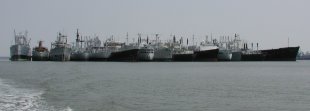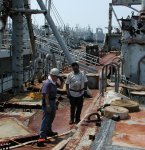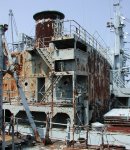Maritime Ghost Fleet: Opportunity or
Environmental Hazard?
Rosanne Skirble Washington 15 Jun 2002, 06:43 UTC
Listen
to Rosanne Skirble's report (RealAudio)
Skirble
report - Download 888k (RealAudio)
 |
A decaying fleet of ships
that few people even know exists is anchored off the American East Coast
state of Virginia. That's because the ships, some more than 150 meters
long and as tall as twelve story buildings, are huddled together in the
waters near a military base and largely hidden from view unless you are
on the water. There's no easy way to get rid of those ships, which are a
potential environmental nightmare. |
| The 'Ghost Fleet'
floating in Virginia's James River VOA Photo - R. Skirble |
Article is copied on site to save the information too
many links vanish. |
link
to original article |
On both sides of a commercial shipping lane on the James
River in southern Virginia is a floating grave yard for retired U.S. merchant
ships. Tied together with thick wire cables, the ancient flotilla creaks and
groans with old age.
 |
 |
The
retired USS Marshfield with missile silos still intact
VOA Photo - R. Skirble |
 |
The 100 ships anchored here once carried cargo, missiles, and
rescue equipment, helicopters, satellite-tracking devices and troops around the
globe. This is the James River Reserve Fleet, commonly known as the Ghost Fleet.
The ships, retired navy and merchant vessels, are rusted and corroded and slowly
deteriorating.
 |
 |
Bob
Rohr
VOA Photo - R. Skirble |
 |
Bob Rohr is Fleet Operations and Maintenance Officer. His job
is to keep the ships afloat until they can be demolished and recycled. Today he
is out on the James River for a routine inspection. "We're heading for Unit
Three or row three," he says. "This row is primarily scrapers. Some of
the older ships, as you will see, are here and on the other end and one or two
that we have been spending a little bit more time on recently patching some
leaks. I think they are still pumping (water in search of a leak). I thought we
would go by and take a look where they are at with that."
The pumping is on the Marine Fiddler, a ship built
to carry troops at the end of World War II. It became part of the Ghost Fleet
almost thirty years ago. Now it is rusted and paint has flaked from every
surface. Maintenance is no small task, says Bob Rohr, who guides us to the upper
deck, which stretches nearly 160 meters. "One of the problems that we run
into here is the amount of growth that is at the bottom of these ships," he
says. "It is almost like a floating reef. It is very difficult for a diver
to find a small hole, especially a small hole and that is typically what they
are."
 |
 |
Workers
conduct a pumping operation while looking for a leak on the Marine
Fiddler
VOA Photo - R. Skirble |
 |
Water is pumped out of the ship to locate the hole, which is
no bigger than a small coin. Bob Rohr spends $20,000 a year on damage control
for each ship, patching leaks over and over again on the Marine Fiddler and on
the other ships in the Ghost Fleet. But, he has few other options. It costs even
more, $2.7 million, to dismantle and dispose of a single vessel.
 |
 |
Patricia
Jackson
Courtesy: James River Association |
 |
Patricia Jackson, executive director of the James River
Association, worries that the Ghost Fleet is an environmental accident waiting
to happen. Her watchdog group is charged with conservation of the James River,
the longest and most important waterway in Virginia. "Many of these vessels
still have oil on them. Many of them have PCBs, heavy metals and asbestos. All
of these things are very harmful to the environment," she says. "And,
in the event of some kind of a catastrophe, if the ships deteriorated, if there
was some kind of natural event like a hurricane that caused them to break apart,
break loose from their moorings we could have an environmental disaster on the
James. And, all of the natural resources, the oyster beds, the fish population,
the wetlands that are so important to their habitat would all be directly
impacted as well as many the historic sites."
Congress has mandated that the Maritime Administration, the
government agency that has custody of the James River Reserve Fleet, dispose of
the Ghost Fleet by 2006, but has not yet appropriated the money to do the job.
This leaves Curt Michanczyk, who directs the disposal program, with a problem.
"We have a backlog of ships that continues to increase. In other words we
receive more ships than we are able to dispose of and that bothers us," he
says. "That's a problem that we feel contributes to environmental threats
even though we dispose of the ships that we feel are the highest priority and in
the worst shape. Obviously there is always that potential that we are not
disposing of ships at a fast enough rate and maybe we will have a discharge
incident."
 |
 |
The
rust covered Arthur Huddell rests in the 'Ghost Fleet'
VOA Photo - R. Skirble |
 |
Discharges of oil from the James River Reserve have the
potential to cause hundreds of thousands to millions of dollars in environmental
damage, depending on the severity of the discharge. This wasn't a problem prior
to 1995, because the United States recycled its retired ships abroad. But new
health, safety and environmental laws that require the removal of PCBs from the
merchant fleet put an end to overseas scrapping.
Curt Michanczyk says one alternative has been to turn the
ships into artificial reefs. "The reasons people want people want reefs are
various," he says. "One of the main ones is to improve fishing, to
build additional reefs where they don't have any reefs because that will
increase both commercial and sport fishing. Some of the other uses are to
promote marine life beyond the fish species. There may be a damaged area or
where a state desires to grow other reefs so in the absence of rock or some
other material a ship makes great sense. One of the other uses that is quite
popular is for recreational diving."
Unfortunately not all ships in the Ghost Fleet are
candidates for artificial reefs. Even if they were, the cost, although less than
scrapping, is still $1 million for each ship.
Some coastal states like Florida see a long-term return on
the investment. Florida recently purchased the Spiegel Grove, a 56-year
old navy ship, which served in the Mediterranean and in the Caribbean during the
Cold War. It has been part of the Ghost Fleet for over a decade.
Tim Mullane is operations manager for Bay Bridge
Enterprises, the company hired to make the Spiegel Grove safe enough to
sink. He says it took a 30-man crew nearly four months to remove all
contaminants and practically everything else from the ship. "The rule is
anything that is loose or unattached has to come off. Anything that anybody can
play with and possibly get off the ship has to come off the ship," he says.
"Any wood or plastic has to come off the ship. Rubber items have to come
off the ship. Any chains or cables had to be removed. Anything that a diver
could manage to catch themselves on or wrap themselves up in had to come off the
ship."
The Spiegel Grove, the largest ship ever turned into
an artificial reef, was sunk this month in the National Marine Sanctuary off the
Florida coast.
Curt Michanczyk, who manages the disposal program for the
U.S. Maritime Administration, applauds the effort. But, he says, it is only a
beginning. He is working with the maritime industry to come up with other
innovative solutions for recycling.
He says what's needed is for Congress to better understand
the environmental hazards associated with these obsolete ships and appropriate
the funds to do something about them. And he says a dialogue between the
Maritime Administration and Congress is underway for that purpose.





